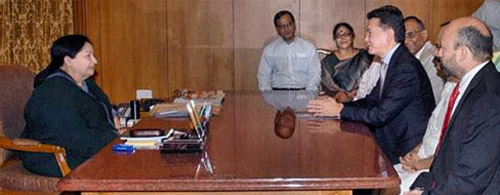Tamil Nadu Grooms Players Into Champions

Four months before India became free from the British, the Madras Chess Club was formed on April 26, 1947. It is the oldest Indian chess institution on record, older than its parent body, the All India Chess Federation.
History has made this organisation change names to the Madras State Chess Association and later to the Tamil Nadu State Chess Association. It has had able and dedicated administrators grooming players into champions.
Dynamic secretaries, resourceful and visionary presidents, talented players, easily understandable systems with clarity are the hallmarks of this historic, vibrant organisation which has stood the test of time.
The crowning jewel who represented the state and the nation and went through the system to conquer the world, Viswanathan Anand said, “Tamil Nadu is one of the chess nuclei of the country.” Speaking about his sponsor during the crucial period 1991-1995, Anand also remarked: “Under the leadership of Venketrama Raja, the association is making rapid strides towards developing chess talent among juniors.”
Further, Anand singled out Dr N Mahalingam, former President of both the All India Chess Federation and the Tamil Nadu State Chess Association, as the “cornerstone” of the association. “Some of the early breaks in my career happened at the Sakthi series of events sponsored by him.”
Behind India’s success story in chess, are many Tamil Nadu players, both men and women. As on date, Tamil Nadu officially has 12 grandmasters while the rest of the country has 20. One third of India’s FIDE-rated players come from Tamil Nadu itself. Most of the National titles are won by players from Tamil Nadu. In the organisation field too, many Indian events are organised in the southern state of Tamil Nadu.
Tamil Nadu’s growth is balanced. Players, officials, arbiters, coaches, administrator, sponsors and chess lovers have come together to make Tamil Nadu chess boom.
Looking at secretaries, S.K. Narasimhan streamlined the AICF during its formative years and laid the foundation for obtaining recognition from the Government of India. At the 1960 FIDE General Assembly in Leipzig, he was elected Vice President of FIDE, the first from Asia. A year earlier, in Amsterdam, he was elected a Vice President of the International Correspondence Chess Federation. Importantly, SKN never aspired for any of these posts. His tireless efforts led to the organisation of the Asian Zonal final in Madras and India getting its first International Master in 1961, Manuel Aaron.
Many of Tamil Nadu’s firsts became India’s first; like, when Anand won the 1987 World Junior, and completed his final Grand Master norm in Coimbatore in 1987 to become India’s first Grand Master. Similarly, during his tenure as Secretary of Tamil Nadu, D.V. Sundar organised the important Butterfly Candidates match in Chennai in January 1991 between Anand and Alexey Dreev. After winning his first Candidates match at home, Anand moved on to rule the chess world.
In women’s chess too, India’s first Woman Grand Master was S Vijayalakshmi of Tamil Nadu (in 2000). India’s first Grand Master tournament was organised and sponsored by the BHEL at Trichy in 1978. In 1987, the country’s first woman Grand Master Tournament took place in Chennai and was sponsored by the Madras Refineries Limited. Both of these pioneering events were due to the initiative of sportslover V.R.Deenadayalu.
Tamil Nadu’s strength is its sheer number of players. Every chess exploit by Anand, is followed by waves of people taking to chess. Success of one Tamil player inspires the belief among ordinary families that “if he can do it, we can do it!” Chess academies and tournaments are flooded with entries in the post Anand phase. After his first world title in December 2000, more children came to chess in the summer of 2001 as tournament entries bear proof.
In recent times, FIDE entrusted the organisation of the Golden Jubilee edition of the World Junior Chess Championship to Chennai in August 2011 in view of the high standing and reputation of Tamil Nadu. When this became history, FIDE awarded the Anand v Carlsen match to Tamil Nadu in 2013 using the “right of first refusal” and did not open the usual bidding process.
The President of the All India Chess Federation, J.C.D.Prabhakar, who is a Member of the Tamil Nadu Legislative Assembly, has played an important role in getting the 2013 World Championship Match to Chennai.
Tamil Nadu is blessed with great patrons in both government and private sectors. In sponsoring the 2013 World Chess Championship, the Tamil Nadu Chief Minister J Jayalalithaa has projected the state into a new organisational, unsurpassable high. Under her Government, the Chess in Schools programme in the age group 7-17 has been intensively implemented.
Tamil Nadu’s exalted chess dream continues. The extraordinary efforts of an extraordinarily creative State multiplies its many successes.